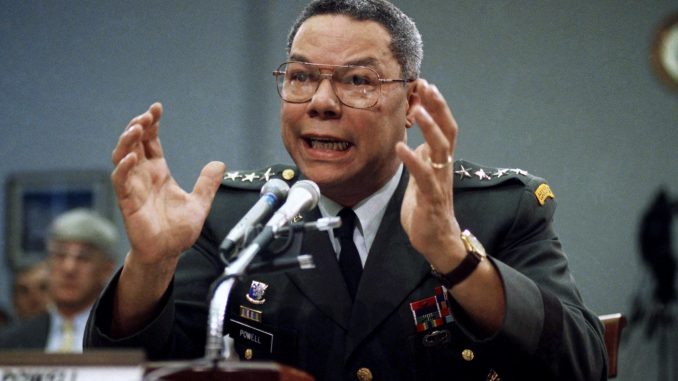
By John Schilling
Colin Powell, the four-star general and first Black U.S. Secretary of State, died on Monday, Oct. 18 at the age of 84. Despite being fully vaccinated, Powell died due to complications from COVID-19, according to Powell’s family who announced his passing on Facebook.
Powell also suffered from multiple myeloma, a form of blood cancer found in the plasma cells that can compromise immunity, according to CNN.
He was a first-generation American born in Harlem in 1937, beginning his military career with the Reserve Officers’ Training Corps (ROTC) at the City University of New York (CUNY), where he received his Bachelor of Science degree in geology in 1958.
“The City University of New York mourns the loss of Colin L. Powell, a true American hero who began his lifelong mission of service to his nation here at The City College of New York,” CUNY Chancellor Félix V. Matos Rodríguez released in a statement. “Powell will be remembered as a soldier, a general, a statesman, and a pioneer who broke racial barriers wherever he went throughout his distinguished and historic career.”
After his time at CUNY, Colin Powell rose to national recognition after serving in Vietnam as an advisor to the South Vietnamese Army from 1962 to 1963, and as a major from 1968 until his return to the United States in 1971.
From 1987 to 1989, Powell served under President Ronald Reagan as the 16th United States National Security Advisor. In this role, Powell is credited with negotiating arms treaties with the Soviet Union at the end of the Cold War, according to the New York Times.
Soon after, Powell was selected to be the 12th United States Chairman of the Joint Chiefs of Staff by President George H.W. Bush. In his position, Powell juggled over two dozen incidents, including an effort to remove General Manuel Noriega from power during the invasion of Panama in 1989 and “the Desert Shield and Desert Storm operations in Iraq” during the Persian Gulf War in 1991, reported History.com.
His efforts resulted in what became dubbed as the “Powell Doctrine” in which he advocated for “overwhelming force” in military operations to prevent as many casualties as possible. “Our strategy to go after this army is very, very simple,” Powell told reporters in 1991, at the start of the Gulf War. “First, we’re going to cut it off, and then, we’re going to kill it.”
Powell’s strategy proved to be successful as the coalition led by the U.S. emerged victorious from the Gulf War, and Powell’s reputation rose to high prominence as he considered running for president in the mid-1990s and early 2000s.
His legacy, however, would be called into question when he was appointed Secretary of State by President George W. Bush in 2001 and went on to build a case for the 2003 invasion of Iraq, which stirred controversy when Powell used evidence disputed by a 2004 Iraq Survey Group report that falsely asserted that the Iraqi government had weapons of mass destruction.
Powell later looked back on his advocacy of the Iraq War and referred to it as a “blot” on his record, according to the New York Times. Despite this, former President Bush had nothing but praise to offer Powell upon the news of his passing.
“He was a great public servant, starting with his time as a soldier during Vietnam. Many Presidents relied on General Powell’s counsel and experience,” the former president released in a statement. “He was highly respected at home and abroad. And most important, Colin was a family man and a friend.”
While some may remember Powell for his military accomplishments and national reputation, Powell’s legacy lives on through City College’s Colin Powell School for Civic and Global Leadership, which was established in 2013 and transformed from the Colin Powell Center for Policy Studies that he had founded at CUNY in 1997.
According to Chancellor Matos Rodríguez, the school is committed to “developing the next generation of civic-minded leaders committed to public service and rooted in the social sciences,” and now more than ever, it bears the responsibility of forming leaders like Powell.
“Speaking two and a half weeks ago with his daughter Linda Powell, a member of the school’s Board of Visitors, he reiterated the great pride he derived from his origins and upbringing, including the many lessons he learned at CUNY,” Matos Rodríguez continued in his statement. “General Powell’s devotion to the nation, and the history-making roles he played in shaping foreign policy during the last 40 years, will always be remembered and celebrated, as will his devotion to public service and to the students of the City University of New York.”
